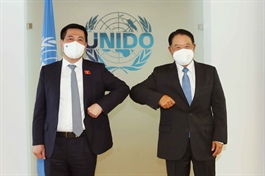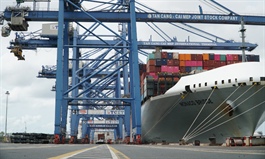Room remains for Vietnamese exports to Russia
Room remains for Vietnamese exports to Russia
There remains huge room for Viet Nam to boost exports of farm produce, seafood, foodstuffs and beverages to Russia, which has great demand for these goods, experts have said. 
Currently many Vietnamese products are unpopular in Russia despite the huge market demand, online newspaper dangcongsan.vn cited Vice chairwoman of the Russia – Viet Nam Friendship Association (RVFA) Regina Budarina as saying.
For example, fresh Thai mangoes are available in Russia, but lack of consumption channels has led to the rare presence of Vietnamese mangoes in this market thus customers who have demand for this fruit have to go to markets or cafes operated by the Vietnamese.
Also, Russian customers prefer Indian rice to that of Viet Nam due to more competitive prices.
In order to effectively penetrate the Russian market, she suggested Vietnamese businesses follow the shortest path which is to promote market research. Although initially, market research might cost businesses a lot of money, but in the future, it would facilitate their exports to Russia, she said.
Frequent seminars and exhibitions would be also needed to bring Vietnamese products closer to the Russian market, she said, adding that Vietnamese firms should consider shipping their goods to Russia by rail through China to reduce transportation costs.
According to the Vietnamese Trade Office in Russia, farm produce, food and consumer goods are mainly sold at retail chains. Besides product quality and design, businesses also needed to ensure sufficient supply of goods.
In order to bring goods into these chains, in addition to product quality and design; businesses need to meet the important requirement of constantly having stock at the warehouse to supply regularly to stores.
The good news is that at present, a number of agricultural products and processed agricultural products from Viet Nam have gradually accessed Russian retail systems, such as mango, chili sauce, dipping sauce, pomelo and dragon fruit, the office said.
However, the quantity of items was still modest, it noted.
Over the past years, the office has connected many Vietnamese enterprises with suppliers who provided Vietnamese agricultural products such as ginger, grapefruit, and vegetables to the Russian supermarket chains.
However, Vietnamese firms have still encountered several difficulties due to their failure in ensuring stable and long-term supply of goods in large quantities. Therefore, in order to export to Russian stably, the firms needed to draw up a suitable strategy and build a supply system in the host country to supply supermarket chains there, the office said.
Along with the efforts of trade promotion organisations and domestic industry associations in connecting the two countries' businesses amid the complicated development of the COVID-19 pandemic, the office said it would continue to facilitate trade promotion activities in order to support businesses in the new context while organising seminars and business matching events on specific industries and fields in order to create opportunities for Vietnamese goods to enter the Russian market.
Meanwhile, in order to maintain growth and improve the market share of Vietnamese agricultural and seafood products in Russia, economists advised businesses to focus on ensuring the prestige and quality of export products, boost processed farm produce exports, and diversify the range of products made from fresh fruits to improve their competitiveness in Russia.
Relevant authorities needed to strengthen assistance for trade promotion and market forecasting, and provide specific information to help businesses prepare for approaching and expanding trade with Russia, they said.
Over the past six months of 2021, two-way trade reached US$2.62 billion, up 16 per cent per cent year-on-year, with Vietnamese exports worth $1.66 billion, up 31 per cent year-on-year, according to the General Department of Customs.
Among staples recording a significant turnover increase were textile and garment with $195 million, up 54 per cent; seafood with $87.5 million, up 64 per cent; fruit and vegetables with $42 million, up 50 per cent; cashew nuts with $25.3 million, up 48 per cent; electronics, computers and parts with $253 million, up 46 per cent, handsets and component with over $500 million, up 6.4 per cent.
From January to June, Viet Nam's imports from Russia saw a modest decline of 3.3 per cent to over $967 million with main goods including chemical products; paper, pharmaceuticals, plastic materials and automobiles.



























